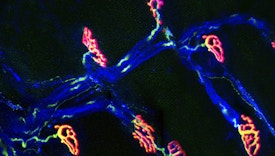
Adi Mizrahi, Ph.D.
Eric Roland Professor in Brain Sciences, The Hebrew University of Jerusalem
SFARI Investigator WebsiteAdi Mizrahi is the Eric Roland Chair in Brain Sciences at the Hebrew University of Jerusalem. He received his Ph.D. from Ben Gurion University and postdoctoral training at Duke University School of Medicine and established his independent laboratory at the Hebrew University of Jerusalem in 2005.
Mizrahi’s lab is interested in the neuronal basis of experience-dependent plasticity in sensory systems, focusing on the auditory and olfactory domains. His lab studies perceptual learning and category learning as two lifelong processes that shape brain function and behavior in adults, as well as parental behavior as a natural form of plasticity. The lab is a systems neuroscience lab using anatomical, physiological and behavioral methods, studying the mouse as a model system. His lab is one of the leading labs in establishing methods like rabies tracing and activity-dependent genetic access to active neurons in the auditory system.
Mizrahi’s lab pioneered in vivo two-photon calcium imaging in the auditory cortex and extended these methodologies to targeted two-photon electrophysiology. The research team has an established track record in olfaction, particularly in studying how adult born neurons integrate into the existing circuitry and shape olfactory coding. Among the many discoveries in his lab, the team found that functional architecture of the mouse auditory cortex is heterogenous (Rothschild et al., Nat. Neurosci., 2010), that natural odors have a strong impact on representations of natural sounds in an experience-dependent manner (Cohen et al., Neuron, 2011) and that the temporal association cortex plays a key role in maternal behaviors (Tasaka et al., Neuron, 2020).
